
Spruce up your vocabulary
The English language can be a beast. On top of its own linguistic foundation, it includes hundreds of borrowed words, from wanderlust (German) to ballet (French). Mix in regular revisions to the dictionary and thesaurus and you have a language that’s an endless challenge to master. This year, why not expand your vocabulary one thesaurus section at a time? Start with our alphabetical list of these less commonly used words from the Merriam-Webster Thesaurus. Which ones do you know—and which ones can you learn in time to squeeze into a conversation this week? And since this article will probably pique your curiosity about the handy reference book, here’s some information on how the first thesaurus got started.

Apoplectic
You know the cartoon image of a red-faced man who’s so angry that there’s actual steam coming out of his ears? That’s what apoplectic looks like. Merriam-Webster’s thesaurus simply defines the word as “feeling or showing anger,” while the dictionary takes it up a notch with “extremely enraged” and “of a kind to cause or apparently cause stroke.” Synonyms include fuming, furious, and irate. Prefer to see it used in a sentence? How about this: Sally’s mother was so apoplectic when she saw the mess in the kitchen that she stomped her feet in a fit of rage. But be careful: It’s not always easy to swap in a synonym. Just check out these 22 hilarious examples of how not to use a thesaurus.

Bibelot
Those who love shiny objects probably have a lot of bibelots scattered around the house. These same people likely enjoy thrifting or browsing flea markets and boutiques in search of the next addition to their bibelot collections. “Small objects displayed for their attractiveness,” bibelots can be a lot of things—knickknacks, trinkets, and baubles, to name a few. If you’re the kind of collector who boxes up bibelots and stores them in the attic, you should check our list of 25 things in your house that could be worth a lot of money.
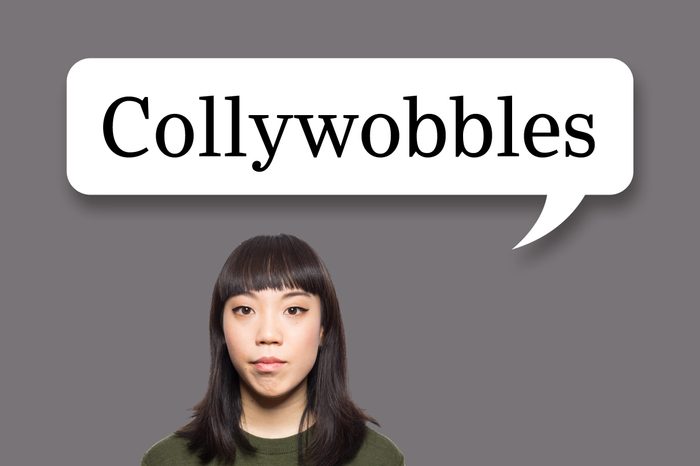
Collywobbles
Oh, how our grandmothers warned us about the collywobbles. Don’t swim right after eating—you might get the collywobbles. Don’t stuff yourself with too many sweets—collywobbles! Don’t sneak too many tastes of chocolate-chip cookie dough—raw eggs cause collywobbles! The collywobbles are simply “abdominal pain, especially when focused in the digestive organs.” It can describe the sort of bellyache or stomachache you experience after a big meal or during a bout of influenza. If you have the collywobbles today, here are 9 natural remedies for your upset stomach.

Dregs
Anyone who’s found sediment at the bottom of a cup of coffee or tea has dealt with the annoying presence of dregs. It’s a simple term for “matter that settles to the bottom of a body of liquid.” Synonyms include grounds, sediment, or settlings. The term can also be used negatively, to describe the cast-off, trash-destined remains of a meal or experience.

Erudite
You’re probably an erudite person if you’ve known all the words on this list so far. Erudite people love learning. It’s a quality often manifested in our English professors and leaders since those who are erudite “have or display advanced knowledge or education.” There are several synonyms for this word, including scholarly, literate, educated, and well-read. If one of your 2020 resolutions is to become a bit more erudite, start by stocking up on these high school English class books you should read again as an adult.

Flummox
Let’s start by using this one in a sentence: “Some of these brain teasers are sure to flummox you.” Or how about, “Dad was flummoxed until he realized he was holding the map upside-down.” This delightful word for “to throw into a state of mental uncertainty” has fun synonyms such as baffle, bamboozle, and confound. According to Merriam-Webster, no one is quite sure where the word originated. It first appeared in Charles Dickens’ novel The Pickwick Papers, and it has been used by British and American word lovers ever since. Maybe you can spot it in some of these other classic books you really should have read by now.
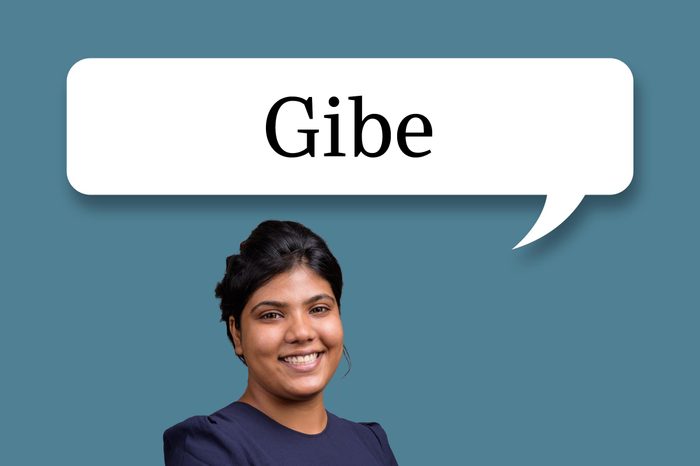
Gibe
Unless you’re one of these 40 skilled comedians, gibing someone is no joke. It means “to make (someone or something) the object of unkind laughter.” While a little ribbing or lighthearted mocking can be acceptable during a sports competition, gibing is the type of behavior that will get you kicked out of English class. Instead of resorting to ridicule or scoffing, study these secrets to telling a great joke. Leave the roasts to the pros.

Hornswoggle
Here’s a word we don’t hear enough in the 21st century. It’s the kind of term you might expect to read in Shakespeare’s plays or a J.K. Rowling novel. First used in the 1800s (unless our sources are hornswoggling us), this funny verb means “to cause to believe what is untrue.” In other words, to lie. So, the next time you realize a friend is hornswoggling you, call his bluff. Or tell a tall tale of your own and see just how long you can hornswoggle (fake out, bamboozle, or deceive) the crowd. And in case you were wondering, this is the best way to spot a liar.
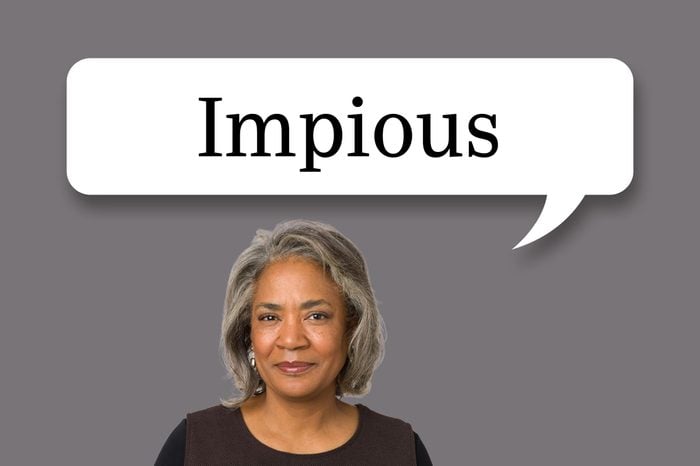
Impious
If you’ve ever giggled at a funeral or burped during the Christmas homily, you’re guilty of impiety. Most of us have had an impious slipup or two, but making a habit of irreverence can be seen as blasphemous. Simply put, being impious is “not showing proper reverence for the holy or sacred.” While our collection of religious jokes might seem impious to some, these witty turns of biblical phrases are all in good fun. In the end, impiety is in the eye of the beholder. What seems sacrilegious to one could be mildly irreverent humor to another. The key is to know your audience and keep it kosher.
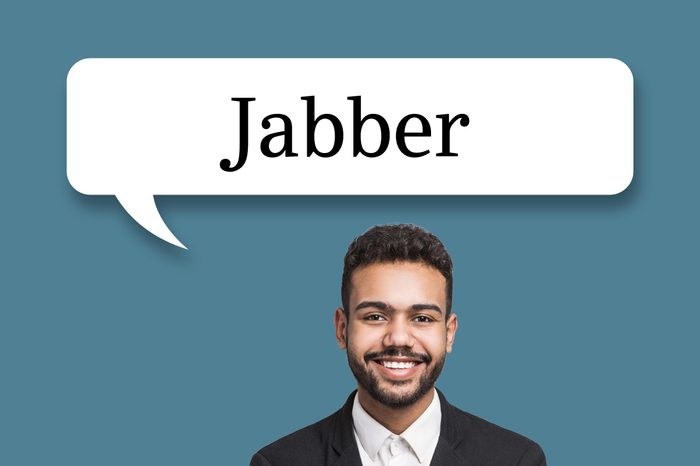
Jabber
The thesaurus is full of zany words that only English majors and logophiles would know. To some, reading them off would sound like a bunch of jabber. Though sometimes jabber refers to the nonsensical babble of toddlers, it can also mean nonsense phrases or unending blabber. The official definition is “meaningless talk.” So, the next time you nod off during a boring lecture or lose track of an illogical argument, simply say that you couldn’t wrap your head around the nonsense—that it was all a mess of jabber. To avoid creating some jabber of your own, make sure you’re not using these 50 words you think are synonyms but aren’t.

Kerfuffle
The evolution of kerfuffle—”a disturbance or commotion typically caused by a dispute or conflict“—took a bit of time. According to Merriam-Webster, the word first appeared in the 16th century as fuffle, a Scottish term for disheveling or making a mess. Later, a word written as carfuffle—”an awkward disorder”—started making the rounds. Eventually, by the 20th century, English speakers had adopted today’s word, kerfuffle, as a general description for noisy chaos.

Louse
Though most parents can recall an unfortunate run-in with lice, not everyone knows that a singular scalp-feeding insect is known as a louse. Given the immediate revulsion we feel when we’re faced with head lice, it makes sense that the term has also evolved into an insult for “a person whose behavior is offensive to others.” Here are some similar words to describe an unsavory individual: creep, dirtbag, jerk, and sleazebag. If you want to avoid being called a louse, check yourself for these behaviors you don’t realize make you look like a jerk.

Macerate
The winning word for the National Spelling Bee in 1972, macerate is pronounced “mas-uh-reyt.” Despite the tricky spelling, the word has an ordinary meaning: “to wet thoroughly with liquid.” The word is common in recipes. You can macerate (soak, drench, marinate) cherries in liquor or macerate berries in sugar water. Here are more of the toughest winning words from the National Spelling Bee over the years.
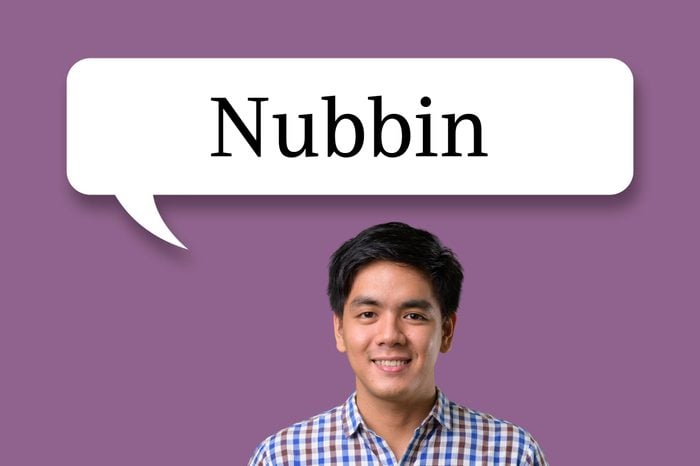
Nubbin
An elongated version of the word nub, nubbin means virtually the same thing: “a very small piece.” For instance, kindergarten children often attempt to continue coloring with only the nubbin of a crayon. But it’s also possible to use the word in place of synonyms like nugget or snippet. When used in this way, a nubbin becomes a sort of summary. For instance, we could say that this list is a mere nubbin of the kinds of fascinating words you might find in the thesaurus.
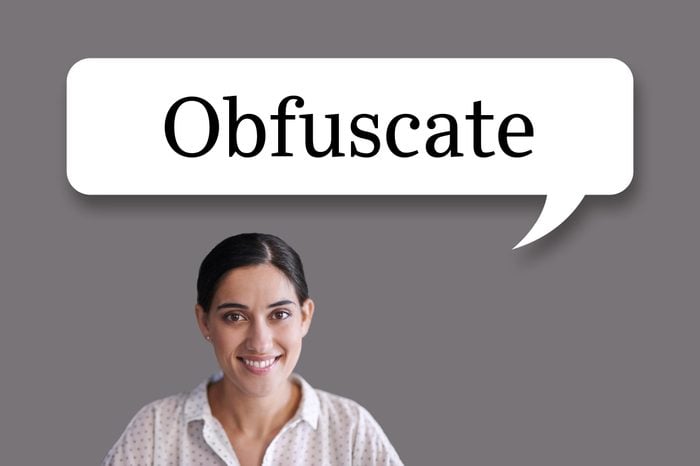
Obfuscate
Sometimes people use big, complex words to obfuscate the true meaning of what they are saying. Or sometimes they beat around the bush instead of getting to the point. Political candidates might talk so much that they obfuscate their true beliefs about an issue. In essence, they “make something unclear or confusing.” Here are a few synonyms for obfuscate: cloud, confuse, and muddy.

Piebald
Ranchers and farmers are likely familiar with this word, which is often used to describe animals. Piebald horses are typically black and white, and many piebald dogs have earned the nickname “Spot.” The definition of the word is simply “consisting of many things of different sorts.” Generally, the word refers to physical appearance—a patchwork quilt or an animal of many colors. But it is possible to use the word to describe other phenomena, such as when Washington Irving wrote in Astoria, “Their language is of the same piebald character, being a French patois embroidered with Indian and English words and phrases.”

Quaff
The world of academics can be a bit tiring at times, so many English teachers quaff a few cups of coffee a day. Maybe you look forward to quaffing a mug of steaming hot chocolate after shoveling snow or a hearty pint of ale after a long day. Despite its funny name, the meaning of quaff is simple: “to swallow in liquid form.” It’s a delightful synonym for more common words such as guzzle, gulp, and imbibe. Most often used in relation to alcoholic beverages, it’s a playful way to describe knocking back a drink or two the weekend. If liquor isn’t your thing, check out these 17 uses for alcohol (besides quaffing it).
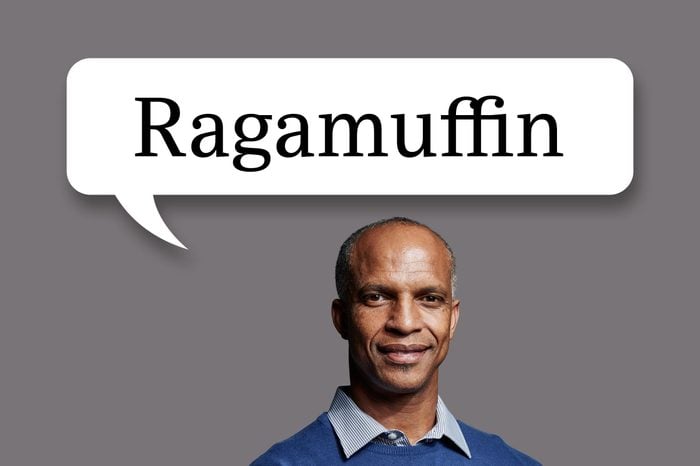
Ragamuffin
Though this word belongs more in a Charles Dickens story than most modern newscasts, it’s still fun to break it out every now and then. The original meaning of the term—”a ragged, often disreputable person” or “a poorly clothed, often dirty child“—could be considered offensive in polite conversation today. But all parents know that sometimes kids look like ragamuffins even when they aren’t technically vagabonds, urchins, or beggars. Some words get phased out over time, like these 13 words from the first dictionary that no longer exist.

Swiller
Speaking of old-fashioned insults, when is the last time you heard someone called a swiller? This synonym for a glutton or pig dates back to the 12th century. The most common synonym for this entry in the thesaurus is the demure term overeater. Though you won’t make any friends going around calling people swillers, it’s a silly jab to have on hand when you notice a family member sneaking cookies from the cookie jar before dinner. Here are 11 words and phrases that used to be insults—but are now compliments.
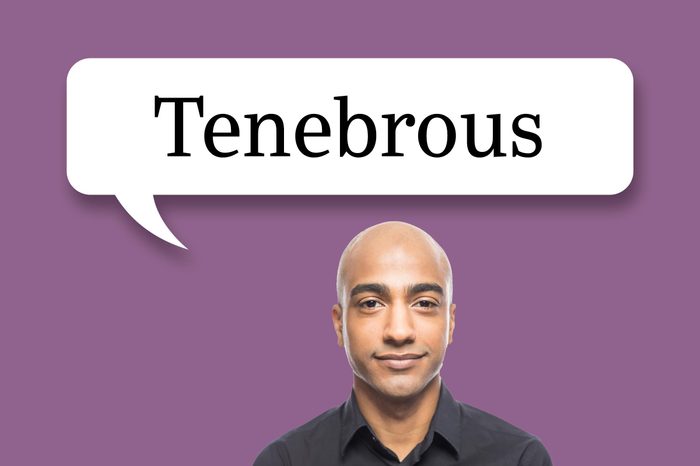
Tenebrous
In the northern hemisphere, the winter solstice is the most tenebrous night of the year. The sun rises, gently slides across the horizon, then sets within hours. According to Merriam-Webster, tenebrous means “being without light or without much light.” The word can be used to refer to something opaque or murky, but it generally describes something darkened, dim, or completely black. In fact, one of the world’s dark-dining restaurants, Tenebris in Bulgaria, takes its name from the same Latin origin.

Ululate
According to Merriam-Webster, Henry David Thoreau once wrote about the cry of screech owls sounding like “u-lu-lu,” a similar syllable pattern to the word ululate. Thoreau was toying with a word that had already been around for a long time. This Latin-inspired verb refers to a distinct long wail, often reserved for times of mourning or rituals of celebration. It’s very similar to words such as howl, keen, or yowl. So while the term has historically referred to human wailing, it’s also a perfect term to reference the howl of a wolf or the sad night cry of an alley cat. Believe it or not, these 15 common words used to mean completely different things.

Vamoose
You’re nearing the end of this list of words in the thesaurus—almost time to vamoose! Vamoose is a quirky word that simply means “to leave a place, often for another.” Why stick to departing when you can clear out, bail, skedaddle, or make a run for it? What’s the fun in exiting when you can round up the family and tell them you’d better vamoose? If you’re the sort who struggles to break away from a friend and vamoose to your next appointment of the day, you’re not alone. Read these polite ways to end a conversation for a bit of gentle advice.

Waggish
As humans, we don’t have tails to wag when we feel playful, but that doesn’t mean we can’t get a little waggish. The word means “tending to or exhibiting reckless playfulness,” and it’s a disposition most often found in children. You know the gleeful toddler who keeps trying to climb on top of the table? That’s waggishness for you. Calling someone waggish isn’t necessarily an insult. It means you think they are impish or mischievous. Who doesn’t want to feel like a kid again once in a while?
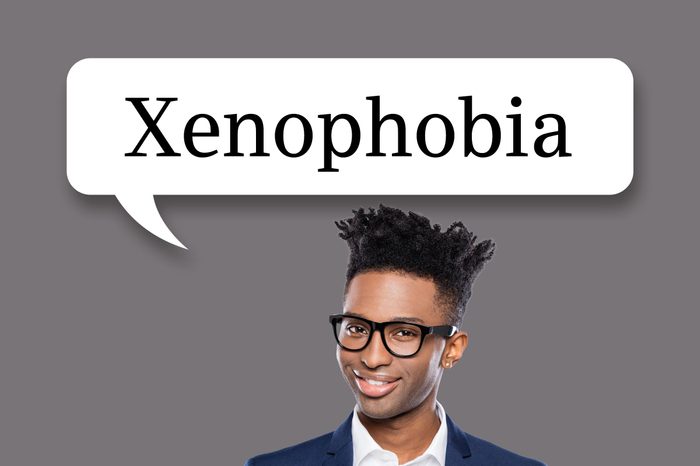
Xenophobia
The online Merriam-Webster Thesaurus only lists ten root entries that start with the letter x. That’s why an x is worth eight points in Scrabble—it’s difficult to use it on the board! (If Scrabble is your game, make sure to check out this list of words that will help you win.) Xenophobia is not a happy word, but it’s still important to understand. It means “fear or hatred of strangers or foreigners.” Xenophobia is the force behind many acts of violence and discrimination in the world. The word has a very specific meaning, but the thesaurus includes this list of helpful near-synonyms: nativism, nationalism, prejudice, and superpatriotism.

Yenta
“Pssst…did you hear about the dinner disaster with that new couple down the street? Do you know why the upstairs neighbors were fighting? Or why the teacher’s kid just dropped out of school?” Oh, the neighborhood yentas! They’re gossipers, tale-tellers, and purveyors of “I heard it through the grapevine…” We all know a yenta, “a person who habitually reveals personal or sensational facts about others.” But that doesn’t mean we have to be one. If one of your New Year’s resolutions is to stop being such a yenta, try using this magic phrase to stop gossip in its tracks.
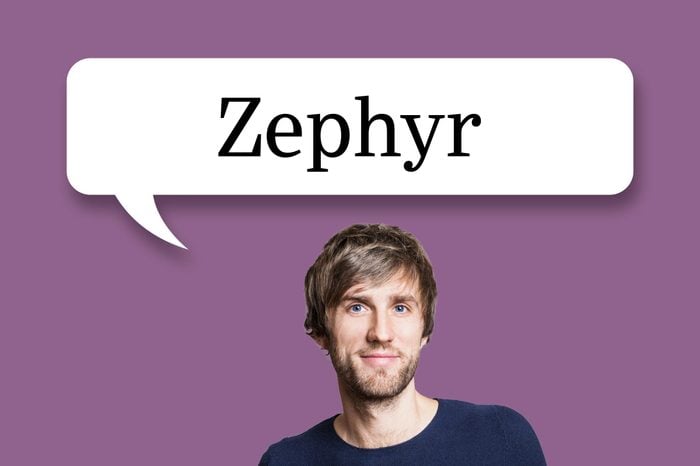
Zephyr
In ancient Greece, Zephyrus was the god of the west wind who gently ushered in springtime each year. Though Greek mythology is long outdated, the poetry of those beliefs lives on. Now, the English word zephyr refers to “a slight or gentle movement of air.” In other words, a breeze. It should feel more like a light puff, rustle, or waft than a draft, and when used properly, the word should give off positive vibes. After all, the spring means flowers, sunshine, and beautiful springtime getaways like these.
